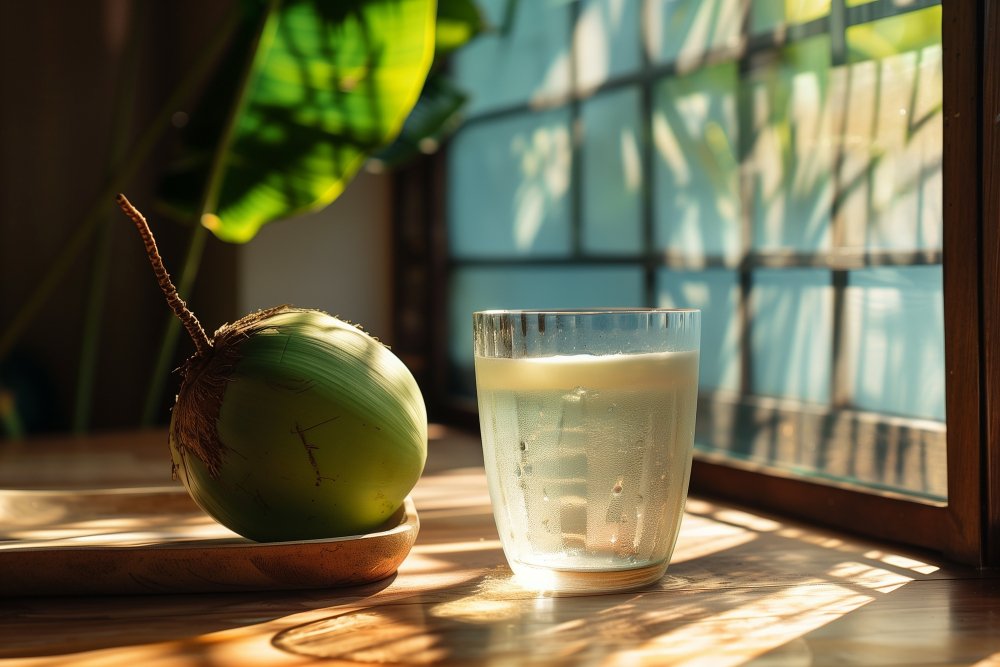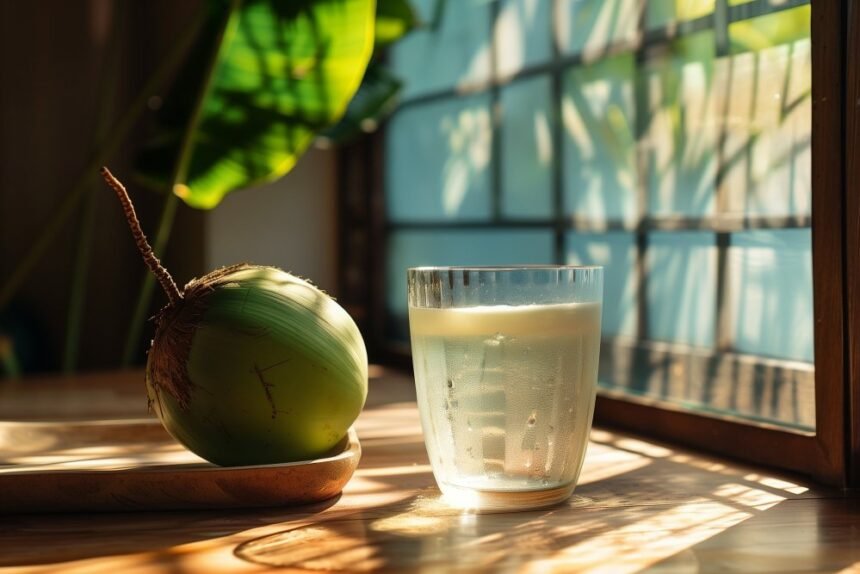
Coconut water is often seen as the ultimate natural drink—packed with electrolytes, low in calories, and incredibly refreshing. But just because it’s natural doesn’t mean it’s suitable for everyone. While it does have health benefits, coconut water may cause unexpected side effects in certain individuals, especially when consumed excessively or without medical advice.
In this article, we’ll explore who should avoid drinking coconut water, the potential risks, and what doctors and experts say, backed by insights from trusted sources like Healthline, WebMD, OnlyMyHealth, India Today, and MSN Health.
🥥 Why Coconut Water Is So Popular
Before diving into who should avoid it, let’s understand why coconut water is so hyped.
According to Healthline, coconut water is:
- Low in calories (around 45 calories per cup)
- Rich in potassium, magnesium, and electrolytes
- A natural alternative to sugary sports drinks
- Known to aid hydration and digestion
It’s often marketed as good for everything—from weight loss and skin health to heart support and detoxification.
But is it really good for everyone?
What Happens When You Drink Black Coffee Every Day for 30 Days?
🚫 6 Types of People Who Should Avoid Drinking Coconut Water
Despite the benefits, there are medical conditions and health situations where coconut water may do more harm than good.
1. People with Kidney Disease
If you have chronic kidney disease (CKD) or reduced kidney function, coconut water may not be your friend.
Coconut water is naturally high in potassium—with around 600 mg per cup. While potassium helps regulate nerve and muscle function, excess potassium can be dangerous for people whose kidneys can’t filter it properly.
WebMD cautions that people with kidney issues should monitor potassium intake closely to avoid hyperkalemia (high potassium levels), which can lead to heart problems or even cardiac arrest.
Alternative: Stick to low-potassium drinks as advised by your nephrologist.
2. Diabetics or People with Uncontrolled Blood Sugar
While coconut water contains natural sugars, it can still impact blood glucose levels. One cup of coconut water can have 6–9 grams of sugar, depending on the brand and maturity of the coconut.
As per OnlyMyHealth, while coconut water has a low glycemic index, it’s still not advisable in large quantities for diabetics, especially when managing blood sugar spikes.
Also, flavored or packaged coconut water often contains added sugars, making things worse for diabetics.
Pro Tip: Always check the label, and if in doubt, consult a dietician before including it in your diabetic diet.
3. Heart Patients on Beta Blockers
Beta-blockers, a common medication prescribed for high blood pressure or heart disease, can raise potassium levels in the blood. Since coconut water already contains high potassium, mixing both can lead to complications.
Healthline mentions that combining coconut water with potassium-elevating medications may cause electrolyte imbalance, resulting in fatigue, muscle weakness, or irregular heartbeat.
Bottom line: If you’re on heart medication, especially beta-blockers or ACE inhibitors, get clearance from your doctor before regularly drinking coconut water.
Fatty Liver: Can You Cure This Liver Condition with Lemon Water? Fact vs Myth
4. Infants Below 12 Months
Coconut water may seem like a healthy natural drink for kids, but it’s not suitable for infants under one year old.
According to India Today, infants should only be fed breast milk or infant formula, and introducing coconut water may disrupt their digestive system and nutrient absorption.
It’s also not sterile and may carry risks if given improperly.
Better choice: For infants, stick with pediatrician-approved nutrition and avoid introducing coconut water too early.
5. People with Allergies or Coconut Intolerance
Although rare, some people may have allergic reactions to coconut products, including coconut water. This may include:
- Skin rashes
- Breathing difficulty
- Digestive issues like nausea or diarrhea
As MSN Health points out, individuals with a known tree nut allergy should be cautious, even though coconut is technically a fruit and not a true nut.
Always do a patch test or consult your allergist if you’re trying it for the first time, especially in large amounts.
6. Athletes Rehydrating After Intense Workouts
Yes, you read that right. While coconut water is often marketed as a natural sports drink, it’s not ideal for every athlete.
Why?
- It contains less sodium compared to most commercial sports drinks.
- It’s low in carbohydrates needed to refuel energy stores post-exercise.
Live Mint and Times of India note that while coconut water is great for light rehydration, it may not replace the electrolyte balance needed after intense, long-duration workouts.
What to do: If you’ve had a strenuous workout, pair coconut water with a salty snack or choose a complete electrolyte drink.
Is Jaggery Better Than Sugar? Health Coach Decodes the Truth
⚠️ General Side Effects of Drinking Too Much Coconut Water
Even for healthy individuals, excessive consumption of coconut water may lead to:
| Side Effect | Explanation |
|---|---|
| Hyperkalemia | Too much potassium can cause irregular heartbeat, nausea, or fatigue. |
| Digestive Issues | Some people may experience bloating or diarrhea. |
| Low Blood Pressure | Potassium can drop BP levels too much, especially in those already on BP meds. |
| Electrolyte Imbalance | Overhydration without sodium balance can dilute your body’s natural electrolytes. |
🧠 Is Coconut Water Safe for Everyone?
In moderation, yes. For most healthy adults, 1–2 cups of coconut water per day is generally safe and can offer hydration benefits.
However, if you have a medical condition, or are on specific medication (especially for the heart or kidneys), you must consult your doctor before consuming it regularly.
👨⚕️ What Experts and Doctors Say
- Dr. Manoj K. Ahuja, a senior nutritionist quoted in Hindustan Times, says:
- “While coconut water is a great source of minerals, it should not be used as a primary source of hydration in medical patients.”
- WebMD highlights that high-potassium foods and drinks should be consumed with caution by those with kidney or heart issues.
- Healthline emphasizes reading the nutritional label carefully, especially when buying packaged coconut water that may have added sugars or preservatives.
✅ Tips to Drink Coconut Water Safely
- Limit to 1–2 cups a day unless advised otherwise.
- Choose fresh, unsweetened coconut water over packaged versions.
- Avoid on an empty stomach if you’re prone to acidity or digestive sensitivity.
- Consult your physician if you have chronic medical conditions.
- Read the labels if buying store-bought versions—avoid added sugars or sodium.
🧾 FAQs
Q. Is coconut water good for weight loss?
Yes, but only when used to replace high-calorie drinks. It doesn’t directly burn fat.
Q. Can coconut water lower blood pressure?
Yes, due to its potassium content—but it should be consumed cautiously if you’re already on BP meds.
Q. Is it okay to drink coconut water daily?
For healthy individuals, daily consumption in moderate amounts is safe. However, people with specific health conditions should seek medical advice.
📌 Conclusion
Coconut water can be a great addition to your hydration routine, but it’s not a one-size-fits-all solution. If you belong to any of the groups listed above, it’s best to proceed with caution—or avoid it altogether.
Remember: even the healthiest drinks can turn harmful when used inappropriately or without understanding your body’s needs.








